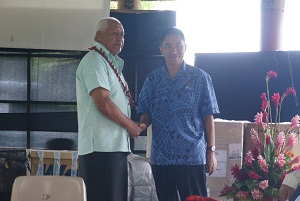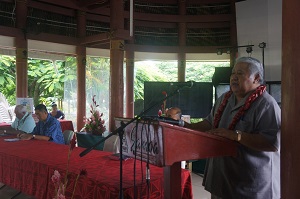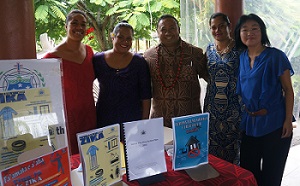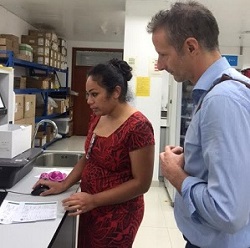The World Health Organization (WHO) handed supplies and information packages for Zika virus control to Samoa Ministry of Health in mid-March. These supplies included vector control chemicals, mosquito control equipment and mosquito
bednets. An information
package with simple and easy-to-implement health tips will be distributed to communities to help protect at risk populations, especially pregnant women.
Dr Baoping Yang, WHO Representative in Samoa, handed supplies to Samoa Health Minister, Tuitama Talaleilei Tuitama.
“Samoa is one of the countries that reported Zika virus transmission. Precautionary measures need to be taken to protect the population from Zika virus infection, especially pregnant women and women of childbearing age.” Dr Baoping Yang, WHO Representative in Samoa, said at the handover ceremony organized by Samoa Ministry of Health, with attendance of Tuilaepa Fatialofa Lupesoliai Dr Sailele Mailelegaoi, Prime Minister, and Tuitama Leao Dr Talalelei Tuitama, Health Minister. Tuilaepa Fatialofa Lupesoliai Dr Sailele Mailelegaoi, Prime Minister, thanked WHO for the continuous support.
On February 1, WHO declared a Public Health Emergency of International Concern, due to the increased incidence of microcephaly (babies born with small heads and brain malformations) and other neurological disorders (in particular Guillain Barré syndrome - GBS) reported in the Americas, potentially associated with Zika virus. GBS is a neurological condition that can lead to paralysis and, in some cases, death. Fifty-two countries and territories have reported local transmission of Zika virus since January.
Zika is caused by a virus transmitted primarily by Aedes mosquitoes. Most people experience Zika infection as a mild disease. The concern is largely about the potential for infection in pregnant women. Although more investigation is needed to better understand the potential link between Zika virus and microcephaly, and Zika and Guillain-Barré syndrome, the evidence for a causal link is getting stronger.
There is no treatment or vaccine currently available for Zika virus. Mosquito control and avoidance of mosquito bites is the most immediate line of defence.
“Prevention and control relies on reducing the breeding sites of mosquitoes through source reduction and reducing contact between mosquitoes and people. We need to work together as a community if we are to address this looming health concern.” stated by Tuilaepa Fatialofa Lupesoliai Dr Sailele Mailelegaoi, Prime Minister.

The Ministry of Health, together with WHO and partners, has strengthened surveillance and public health measures to prevent and control Zika virus transmission, including a national clean-up campaign to eliminate potential mosquito breeding sites, as well as an awareness campaign to promote personal protection measures. WHO’s technical experts in epidemiology, vector control and risk communications areas are on the ground to work closely with Ministry of Health. Zika control requires massive mobilization of community action to complement the work that Ministry of Health and other stakeholders are conducting.
“Populations at risk, especially pregnant women and women of child bearing age, need to be fully informed of the risks associated with Zika virus disease, the prevention and control measures being taken, and what they can do to protect themselves. The hands-on information package provides simple health messages for them.” Dr Yang added.
The Ministry of Health continues to encourage people to take precautions to protect themselves from mosquito bites and especially pregnant women. These include the use of insect repellents that contain DEET or Icaridin, wearing light coloured, long sleeved shirts and pants and ensuring rooms are fitted with screens to prevent mosquitoes from entering homes.

The Samoa Ministry of Health, with support from WHO and partners, also issued travel advice last week. Staff of hotels, hospitals and public places has been trained to spray their areas to protect travellers and the population from mosquito bites. WHO recommends that all people should avoid being bitten by mosquitoes, and pregnant women, women planning pregnancy and people with medical conditions should see their doctor or a travel clinic before travelling to an area reporting an outbreak of Zika virus.

/59748.tmb-300v.png?sfvrsn=9885965b_2)


